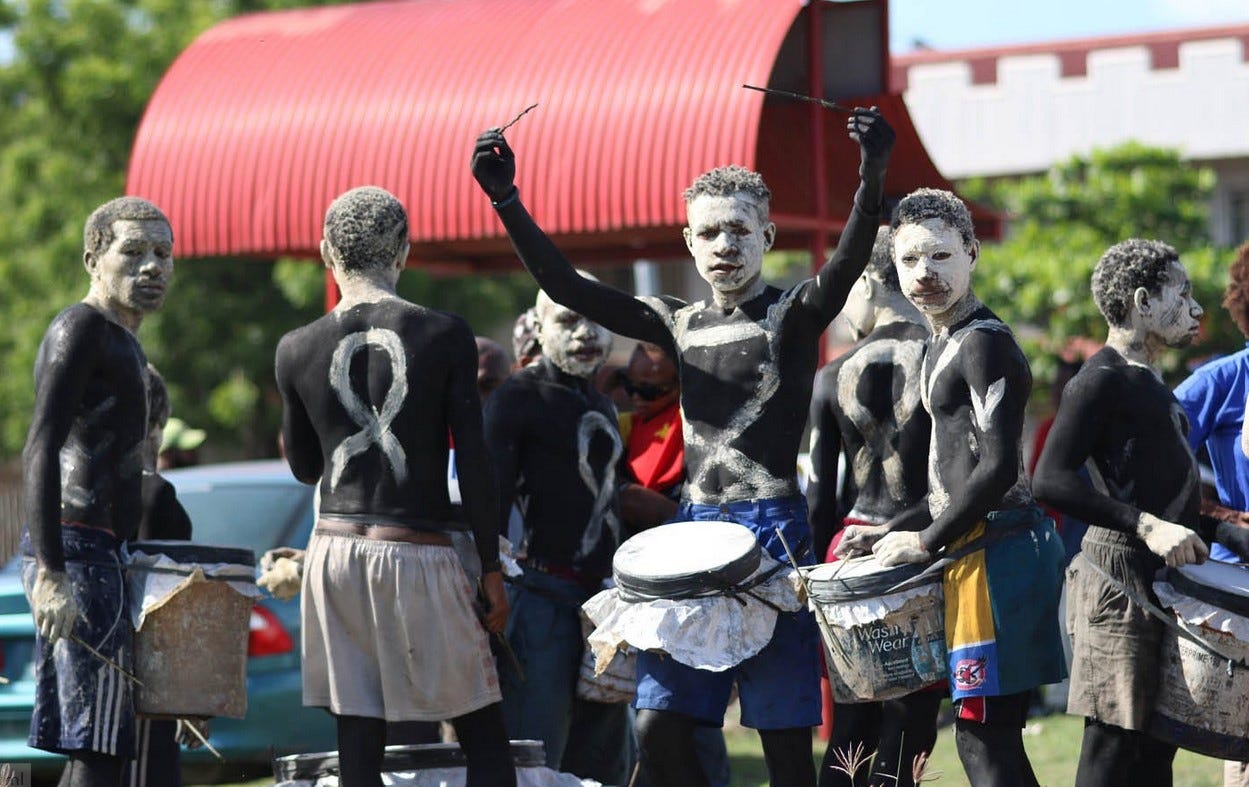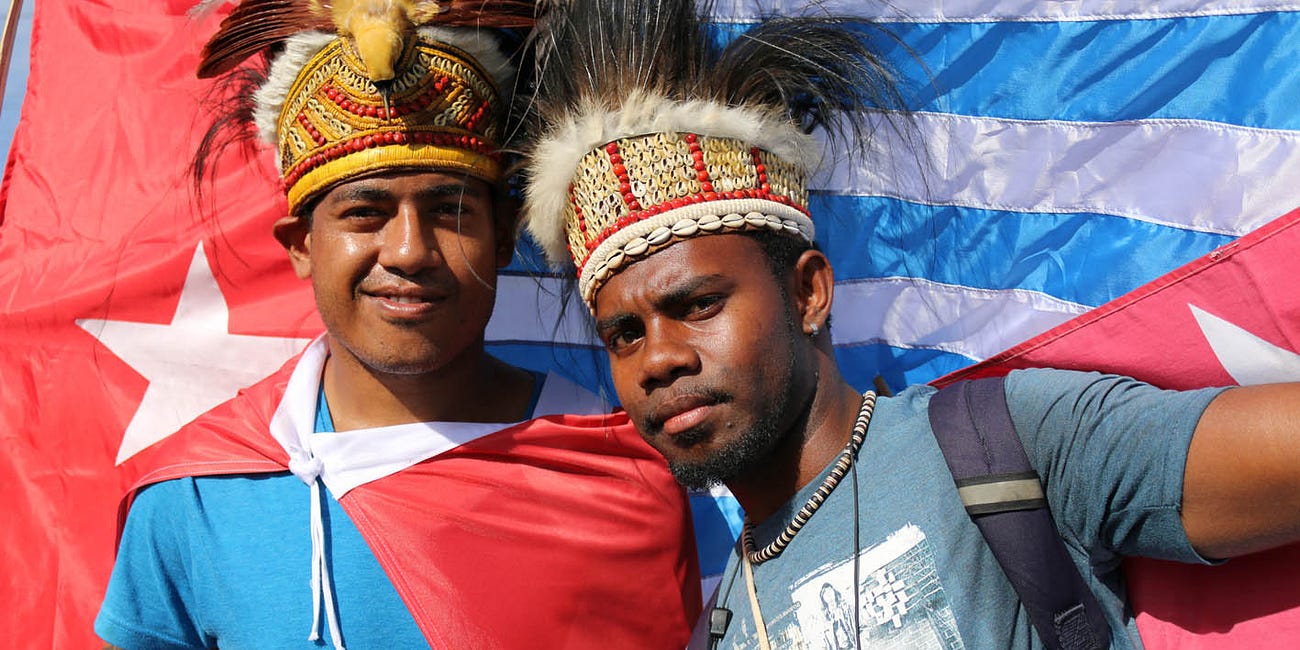Biak Massacre day: 26 years and no justice for West Papua
Indonesia's armed forces murdered villagers for raising the West Papuan national flag, the Morningstar. They butchered the survivors and covered it up. Not one person has been prosecuted
Most Australians don’t know anything about Indonesia’s occupation of West Papua let alone the Biak Massacre where women and children - some still wearing their school uniforms - were viciously broken and raped after their menfolk were shot, their bodies dumped at sea.
Since 1961 when Indonesia invaded, this horror has rolled on in secret because the Australian government is frightened of offending Jakarta.
It is never mentioned by the two major parties, and rarely by the Greens so it doesn’t make the news cycle.
It is harder for journalists to report on West Papua - so close you could paddle there in a canoe - than it is to churn out stories on the Middle East, a world away.
This day, 6 July, marks the 26th anniversary of the Biak Massacre.
Unarmed villagers were sitting at a water tower where they had raised their Morningstar and refused to take it down. They had been there for days.
Indonesian armed forces surrounded them on four sides and opened fire.
Those not shot dead were taken by trucks to two naval vessels moored in the harbour. A large number of people, possibly in the hundreds, were taken out to sea and never seen alive again.
By July 10, the bodies began washing up on Biak’s beaches, many mutilated horrifically. The Indonesian military blamed it on a tsunami in Papua New Guinea.

Nobody has been charged with the killings.
Formal investigations by national and international human rights organizations were all thwarted by Indonesia.
A Biak Massacre Citizens Tribunal was held at the University of Sydney in 2013, after calls for formal investigations were repeatedly ignored.
The hearing was conducted by Australia’s leading legal lights including Nicholas Cowdery QC and Graham Turnbull SC, and presided over by John Dowd, then-President of the International Commission of Jurists, Australia and then-Chancellor of Southern Cross University, together with Keith Suter, chair of the International Commission of Jurists (NSW).
The tribunal reviewed evidence and took witness statements, then documented it.
In his concluding statement, Nicholas Cowdery said:
“This was not, on the morning of the 6th of July, some sort of spontaneous violence, it came after days of careful contemplation by the authorities about what was happening and how it might be approached.”
Morning Star rises in the Amazon of the Pacific as West Papuans mark Independence Day
Decent Indonesians have no idea what their government is doing in West Papua New Trans-Papua highway exposes rainforest to logging, mining, plantations Indonesia, global corporations, stole a mountain of gold, destroying wilderness Up to a million migrants made West Papuans a minority in just 60 years
To commemmorate Biak Massacre day, here is a collection of links where you can read about the ongoing tragedy of this brutal and violent colonisation.
26 years since the Biak massacre: Not forgotten - Australia West Papua Association (Sydney)
Biak Massacre Citizen's Tribunal at Sydney University finds security forces intentionally killed, raped children - Alison Bevege, News Corp Australia Network, 16 December, 2013
“Bullets were raining down," said a woman who cannot be identified. "The sky was on fire."
‘Killed like animals’: documents reveal how Australia turned a blind eye to a West Papuan massacre - Christopher Knaus, Guardian, 19 September 2021.
“They were killing like they killed animals,” he says. “They don’t think these are human beings, they are thinking these are animals.”
Inquiry needed into Australia’s silence on West Papuan massacre, human rights groups say - Christopher Knaus, Guardian, 20 September 2021
“A newly released unredacted intelligence report, shared with the Guardian, shows the Australian government had compelling evidence that the Indonesian military fired live rounds indiscriminately into a group of unarmed West Papuan demonstrators on the island of Biak on 6 July 1998.
The intelligence report also shows West Papuans secretly handed an Australian intelligence officer photographic evidence of the atrocity, at great risk to their own safety. The film was distributed to defence, but never saw the light of day. It appears to have been destroyed in 2014.”
A Secret Genocide: the blood politics of West Papua - Alison Bevege, Australian Quarterly, 2014
“When they are killing people they want to make sure nobody finds out,"said journalist and academic John Martinkus
Mass killings and torture have been reported from the Indonesian territory of West Papua - Alison Bevege, NT News, 22 December, 2013
“The Indonesian military beat my mum down in front of my eye,” he said.
“She fell down bleeding. They took the two girls, my aunties, and made them take all their clothes off. They to go the river and clean their body and come back. Five or six military men raped them. They were 14 years old and 18 years old. I cried. This sentiment I will never forget.”
Forgotten Genocide in Indonesia: Mass Violence, Resource Exploitation and Struggle for Independence in West Papua - Paul Antonopoulos and Drew Cottle, from the book Genocide and Mass Violence in Asia, 2019
“One of the primary methods used by Indonesian authorities to subdue indigenous resistance to international mining firms was to undertake a complete demographic transformation of West Papua … Although the religious conversion of young children is illegal in Indonesia, and the United Nations deems any transfer of a minor, even for education, as trafficking, there are widespread reports of Christian Papuans being taken to Java to be educated in Islamic schools.”






Excellent report.
An all too familiar scenario - people living on ancestral lands are murdered so that empire might profit from the wealth of minerals buried below the ground.
It's happening again in Gaza - there's a wealth of minerals below the Levant.
My daughter just spent a semester at Uni in Indonesia, and in one of her subjects asked to present on the history of Australian and Indonesian relations across the Suharto years, in the context of West Papua. I did a lot of material research - her job was to translate and present it in Indonesian which was difficult enough.
I had to tell her that, born in 1961, I grew up believing only that Irian Jaya was a very dangerous place, full of head hunters, and that we wouldn't want to go there. So close, but a black hole.
From the material I gathered it was all about the mine, about a Freeport director selecting JF Kennedy's National Security Advisor, bringing Suharto there in 1962. I almost saw them promising him leadership, West Papua back to Indonesia, plus a lot of the mine's wealth, if he 'shared it' with the west, and if he slaughtered 500K-1m leftists (as done from Oct 1965 - March 1966). Australian diplomats and media (ABC Radio National) played a propaganda role. On West Papua, we did nothing but appease - this to keep the US bosses happy, as much as anything. That mine is Indonesia's largest single taxpayer.
On Indonesian views on W Papua, she said that occasionally victims of the propaganda will describe the W Papuans as terrorists, justifying all of the Indonesian military/police behaviour.
There's so much money/resources in W Papua, it would be more difficult to negotiate independence than getting Julian Assange out of London.